-
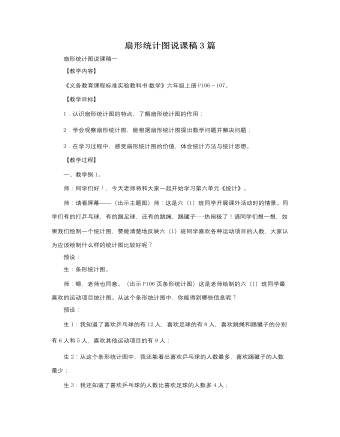
人教版新课标小学数学六年级上册扇形统计图说课稿3篇
三、情感与态度目标教学重点:在合作讨论的过程中体会数据在现实生活中的作用,理解扇形统计图的特点,并能从中发现信息。教学难点:能从扇形统计图中获得有用信息,并做出合理推断。二、学情分析本单元的教学是在学生已有统计经验的基础上,学习新知的。六年级的学生已经学习了条形统计图和折线统计图,知道他们的特点,并具有一定的概括、分析能力,在此基础上,通过新旧知识对比,自然生成新知识点。三、设计理念和教法分析1、本堂课力争做到由“关注知识”转向“关注学生”,由“传授知识”转向“引导探索”,“教师是组织者、领导者。”将课堂设置问题给学生,让学生自己收集信息、分析信息,自主探索、合作交流,参与知识的构建。2、运用探究法。探究的方法属于启发式教学,探究学习的内容以问题的形式出现在教师的引导下,学生自主探究,让学生在课堂上多活动、多思考,自主构建知识体系。引导学生收集资料,获取信息并合作交流。
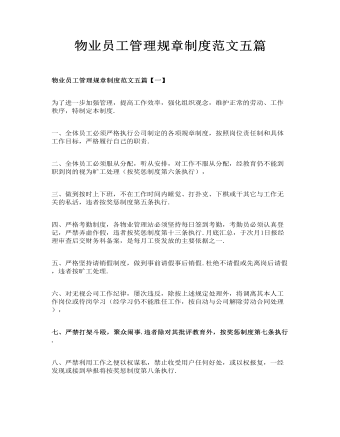
物业员工管理规章制度范文五篇
一、全体员工必须严格执行公司制定的各项规章制度,按照岗位责任制和具体工作目标,严格履行自己的职责. 二、全体员工必须服从分配,听从安排,对工作不服从分配,经教育仍不能到职到岗的视为旷工处理(按奖惩制度第六条执行), 三、做到按时上下班,不在工作时间内睡觉、打扑克、下棋或干其它与工作无关的私活,违者按奖惩制度第五条执行.
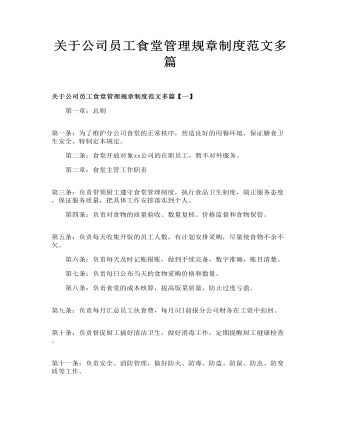
关于公司员工食堂管理规章制度范文多篇
第二章:食堂主管工作职责 第三条:负责带领厨工遵守食堂管理制度,执行食品卫生制度,端正服务态度,保证服务质量,把具体工作安排落实到个人。 第四条:负责对食物的质量验收、数量复核、价格监督和食物保管。 第五条:负责每天收集开饭的员工人数,有计划安排采购,尽量使食物不余不欠。 第六条:负责每天及时记账报账,做到手续完备,数字准确,账目清楚。
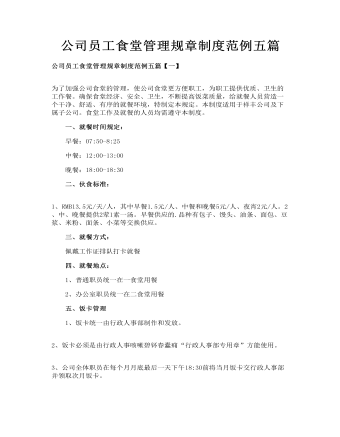
公司员工食堂管理规章制度范例五篇
三、就餐方式: 佩戴工作证排队打卡就餐 四、就餐地点: 1、普通职员统一在一食堂用餐 2、办公室职员统一在二食堂用餐
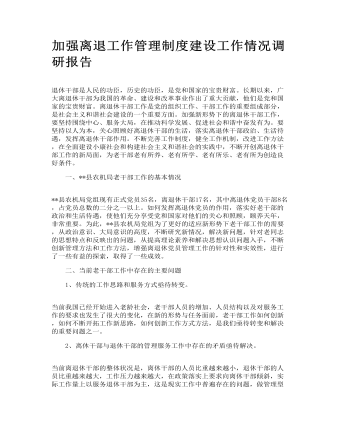
加强离退工作管理制度建设工作情况调研报告
1、传统的工作思路和服务方式亟待转变。 当前我国已经开始进入老龄社会,老干部人员的增加、人员结构以及对服务工作的要求也发生了很大的变化,在新的形势与任务面前,老干部工作如何创新,如何不断开拓工作新思路,如何创新工作方式方法,是我们亟待转变和解决的重要问题之一。 2、离休干部与退休干部的管理服务工作中存在的矛盾亟待解决。 当前离退休干部的整体状况是,离休干部的人员比重越来越小,退休干部的人员比重越来越大,工作压力越来越大,在政策落实上要求向离休干部倾斜,实际工作量上以服务退休干部为主,这是现实工作中普遍存在的问题,做管理型服务还是做劳务型服务,关系到今后的工作导向,这同样是需要认真研究的一个重要问题。
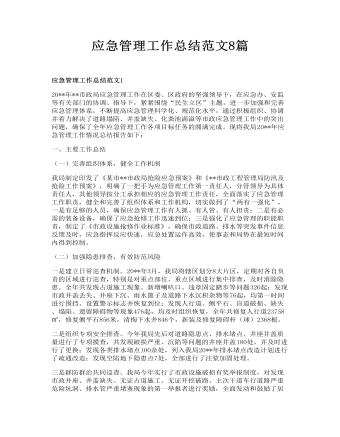
应急管理工作总结范文8篇
(一)完善组织体系,健全工作机制我局制定印发了《某市**市政局抢险应急预案》和《**市政工程管理局防汛及抢险工作预案》,明确了一把手为应急管理工作第一责任人,分管领导为具体责任人,其他领导按分工承担相应的应急管理工作责任,全面落实了应急管理工作职责,健全和完善了组织体系和工作机构,切实做到了“两有一强化”,一是有足够的人员,确保应急管理工作有人抓、有人管、有人担责;二是有必需的装备设备,确保了应急抢修工作迅速到位;三是强化了应急管理的职能职责,制定了《市政设施抢修作业标准》,确保市政道路、排水等突发事件信息反馈及时,应急指挥反应快速,应急处置运作高效,使事态和局势在最短时间内得到控制。
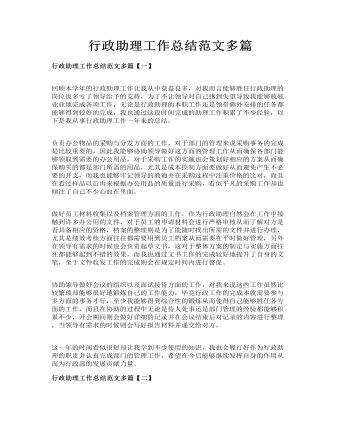
行政助理工作总结范文多篇
负责办公物品的采购与分发方面的工作,对于部门的管理来说采购事务的完成是比较重要的,因此我能够协助领导做好这方面的管理工作从而确保各部门能够领取到需要的办公用品,对于采购工作的实施也会策划好相应的方案从而确保购买的都是部门所需的用品,尤其是成本控制方面要做好从而避免产生不必要的开支,而我也能够牢记领导的教诲并在采购过程中注重价格的比对,而且在看过样品以后再来根据办公用品的质量进行采购,看似平凡的采购工作却也倾注了自己不少心血在里面。 做好员工材料收集以及档案管理方面的工作,作为行政助理自然会在工作中接触到许多办公用的文件,对于员工的申请材料会进行严格审核从而了解对方是否具备相应的资格,档案的整理则是为了能随时找出所需的文件并进行办理,尤其是绩效考核方面往往都需要用到员工档案从而需要在平时做好管理,另外在领导有需求的时候也会负责起草文书,这对于整体方案的制定与实施方面往往都能够起到不错的效果,而我也通过文书工作的完成较好地提升了自身的文笔,至于文件收发工作的完成则会在规定时间内进行督促。 协助领导做好会议的组织以及面试接待方面的工作,对我来说这些工作虽然比较繁琐却能够很好地锻炼自己的工作能力,毕竟行政工作的完成本就需要参与多方面的事务才行,至少我能够得到综合性的锻炼从而使得自己能够胜任各方面的工作,而且在协助的过程中无论是待人处事还是部门管理的经验都能够积累不少,开会期间则会做好详细的记录并在会议结束后对记录的内容进行整理,当领导有需求的时候则会写好报告材料并递交给对方。
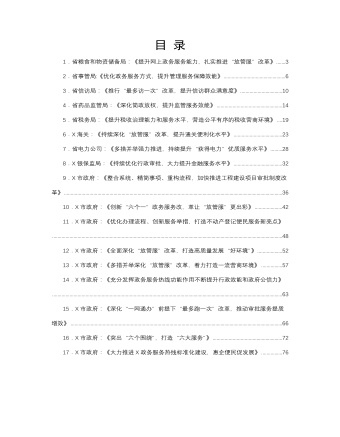
“放管服”改革工作经验总结合集17篇
一、加快推进政务公开,全面实行“网上审批”根据省委、省政府关于推进审批服务便民化的工作要求,省粮食和物资储备局及时制定《X省粮食和物资储备系统省市县三级审批服务事项通用目录》,通过X政务服务网、省粮食和物资储备局门户网站向社会公布行政审批事项清单、办理流程图、办理期限、结果查询方式和咨询监督电话等,全方位推进政务公开,自觉接受社会各界监督。将网上行政审批事项即粮食收购资格认定事项通过省政务服务平台开展审批,申报事项的办理进展情况通过网络等形式及时告知申报单位,对行政审批事项办理过程中的常见问题进行梳理解答,在网站公布,便于公众查阅,切实做到减时间、减材料、减程序、减流程、优服务。二、明确目标任务,完善提升网上政务服务能力X年以来,省粮食和物资储备局对照《省直部门网上政务服务能力完善提升任务清单》逐项梳理,按照时间节点和要求落实相关工作,进一步提升网上政务服务能力。一是根据国家部委网上审批基本目录调整变动情况,结合省大数据局对政务服务事项动态调整情况,及时进行确认落实。二是进一步梳理公共服务事项清单。按照“应上尽上”原则,进一步梳理出应用类、查询类、信息发布类等公共服务事项。三是做好政务服务“好差评”工作。多渠道、全方位对政务服务“好差评”工作进行宣传,不断提升企业对省粮食和物资储备局政务服务事项开展评价的参与度,积极引导企业开展线上线下“好差评”。四是认真做好证照数据归集工作。根据《国家政务服务平台证照类型代码及目录信息》,及时认领国家粮食和物资储备局明确的电子证照,在省级电子证照系统补充完善粮食收购许可证证照类型、证照基本信息和证照底图。三、做好“互联网+监管”工作,加强事中事后监管X年X月,按照《X省人民政府办公厅关于做好政务服务平台和“互联网+监管”系统建设对接工作的通知》要求,及时认领国家级监管事项目录清单中由省粮食和物资储备局实施的监管事项。在认领国家级监管事项目录清单的基础上,梳理补充我省事项,分别编制形成省级监管事项目录清单,并录入国家监管事项目录清单动态管理系统。根据监管事项目录清单,对所有的行政检查事项逐项编制检查实施清单,并在国家监管事项目录清单动态管理系统中填报。一是实行行政许可和行政处罚双公示常态化。在行政许可和行政处罚办结后X日内及时向“信用X”网站、省粮食和物资储备局门户网站推送。二是强化信息归集共享。按照涉企信息统一归集要求,通过国家企业信用信息公示系统(X)统一汇集和公示涉企行政许可、行政处罚、执法检查等企业信息。三是加强事中事后监管。贯彻落实“谁审批、谁监管,谁主管、谁监管”要求,切实履行法定监管职责,加强部门协调配合,进一步完善“双随机一公开”监管机制,为各类粮食经营者营造公平竞争的市场环境。
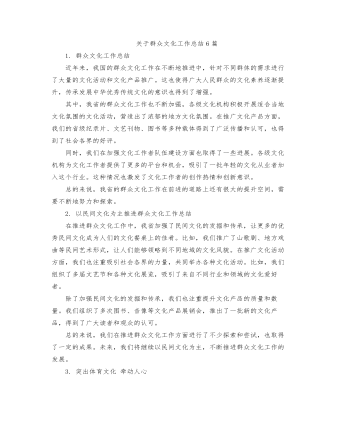
关于群众文化工作总结6篇
在推进群众文化工作中,我们以文化产业为引领,加强了文化产业在经济中的地位。我们增加了对文化产业的投资,鼓励各地加强文化产业的发展。同时,我们也充分利用文化产业的优势,推出了一些高品质、高收益的文化产品,吸引了大量投资和消费。总的来说,以文化产业为引领推进群众文化工作,是一种行之有效的方式。这种方式既有利于文化产业的发展,也可以促进群众文化事业的普及和发展。在以文化产业为引领推进群众文化建设方面,我们省还进行了大量探索和尝试。比如,我们注重了文化产业的结合,将文化产业纳入到经济发展的主要方向中。我们不断探索文化产业在经济中的作用,加强文化产业和传统产业的结合,推动了经济文化的良性互动。除此之外,我们还注重文化产业的结合,加强了文化和科技、文化和旅游等多个领域的相互融合。文化产业在融合过程中不断开拓新的市场空间,推出了更多高质量的文化产品,为社会增加更多的文化价值和经济贡献。
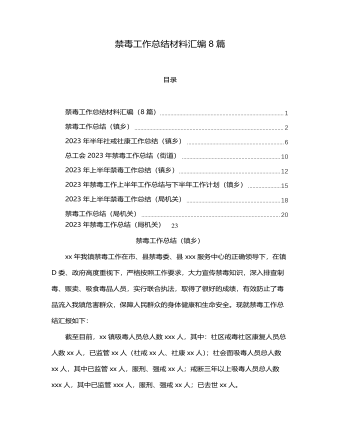
禁毒工作总结材料汇编(8篇)
二、当前禁毒工作中存在的问题(一)对禁毒工作的思想认识有待于提高部分村干部禁毒工作意识薄弱,对禁毒工作不重视,淡化了禁毒工作是一场长期持久的人民战争的意识,影响了禁毒工作总体推进。(二)禁毒宣传工作方式较为单一内容不够丰富,宣传覆盖面不够,没用依靠新的媒介、新的手段提升全民禁毒知识知晓率和公众参与意愿。(三)新型合成毒品预防教育不到位大部分人还不知道新型合成毒品的危害,且有的青年认为其是软性毒品所以不会成瘾,滥用新型合成毒品人员身体上也没有戒断依赖症状,很难发现与惩处。三、下一步禁毒工作计划(一)要发挥头雁作用,以点带面。加强村级禁毒工作,强化村干部的禁毒意识,对村级进行禁毒工作评定,规范村级禁毒台账资料。(二)要丰富禁毒宣传手段。充分利用禁毒宣传进校园、进单位、进社区、进农村、进家庭、进场所等“六进”工作。
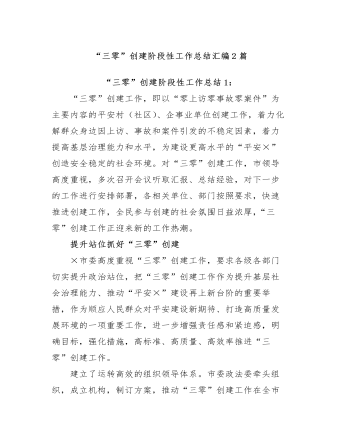
“三零”创建阶段性工作总结汇编2篇
八是强化服务管理,推动实现管好控牢。按月对辖区内的流动人口进行摸排,对重点人员进行摸底更新,动态掌握有关情况。加强心理疏导,对重点关注群体及时开展心理疏导和危机干预工作,努力从心理层面化解消极因素,落实教育矫治、安置帮教、救治帮扶等措施。通过努力,实现出租屋登记备案率达到××%,帮教对象当年无违法犯罪现象。九是强化“三治融合”,推动实现源头预防。推进自治强基。充分发挥“一约五会”和群团组织在基层治理中的作用,引导群众实现民事民议、民事民办、民事民管。落实法治保障。完事各行各业法治宣传教育机制,推进公共法律服务体系建设,创新普法宣传形式,深化基层法治示范创建活动。推进德治引领。将社会主义核心价值观纳入对村(居)民、干部职工的日常宣传教育,依托文明城市创建、美丽乡村建设、无烟单位创建、文明家庭创建、“最美人物”评选等活动,持续加强社会公德、职业道德、家庭美德、个人品德建设,消除歪风邪气,树立文明新风。通过努力,推进“三治融合”不断深化,使“三零”创建的法治保障进一步加强。

关于数据安全工作总结报告4篇
二是制定局各项涉密及非涉密计算机及网络管理制度;三是严格涉密信息流转的规范性,严格执行“涉密信息不上网,上网信息不涉密”的原则。五、完善涉密文件台账。我局建立了完整的涉密载体登记台帐,由办公室机要人员登记并管理。通过台账明确涉密人员对文件收发、登记、传递、归档、销毁等环节的职能,使保密工作真正做到行有规章、做有依据、查有准则,真正实现制度化、规范化、科学化。我局保密工作在市委机要局的领导下,逐步走向规范化、制度化,从未出现过涉密事故。通过认真自查,今年我局保密工作组织能够做到组织领导到位、人员管理到位、涉密操作规范。在今后的工作中,我局将进一步加强对保密工作的重视,强化对涉密内容的管理,力争保密工作取得新成绩,积极探索研究新时期保密工作的新情况、新问题,确保城 管系统涉密工作的顺利开展。

关于医院双拥工作总结4篇
(二)是认真落实优抚政策。在元旦、春节、“八一”等 重要节日和纪念日前夕, 走访慰问单位革命功臣、 军烈属、 革命伤残军人等,了解他们的工作生活情况,并力所能及 地为他们解决一些实际困难。 (三)是做好退役军人安置工作。近几年来,我院共接收安置部队退伍军人 5 名,把他们视为医院的精神财富,都 安排在合适的工作岗位,让他们充分施展才能,成为单位 两个文明建设的主力军。 通过“双拥共建”活动,融洽了军政军民关系,增 强了医院与部队的感情,焕发了干部职工与时俱进、奋发有为的精神风貌, 在我院逐步形成了服务优质、 环境优美、 秩序优良的良好工作氛围。下一步,我们将“百尺竿头, 更进一步”,进一步提高做好双拥工作的主动性,加大军民共建工作力度,不断充实和完善工作内涵,向更高的目标而努力奋斗,不断开创军民共建工作的新局面。

新人教版高中英语必修3Unit 5 The Value of Money- Discovering Useful Structure教学设计
Step 3 Meaning1. 过去将来时表示从过去某一时间来看将要发生的动作或存在的状态, 常用在宾语从句中。一般由“would/should +动词原形”构成。She hoped that they would meet again someday. 她希望将来有一天他们能再见面。2. was/were going to+动词原形: 表示过去将要发生或很有可能发生的动作, 常用于口语中, 表示预言、意图或者打算等。He was going to start work the following week. 他打算下星期开始工作。3. was/were about to do: 常用来表示即将发生的动作, “刚要/正要做……”。注意该结构不与任何时间状语连用。I felt that something terrible was about to happen. 我感到某种可怕的事情即将发生。4.was/were to do: 表示“曾计划做某事”, 如果表示“本来计划做某事, 动作没实现”, 则需用 “was/were to have done”。She said she was to have told me about the accident. 她说她本来想告诉我关于事故的事。5.Start, go, come, leave, see, meet等动词的过去进行时: 表示就过去某一时刻而言即将发生的动作。She was coming later. 她随后就来。I had just put on my overcoat and was leaving to visit a friend of mine. 我刚穿上外套要去看我的一个朋友。

新人教版高中英语必修3Unit 5 The Value of Money-Listening &Speaking&Talking教学设计
4. A:We’d like to have someone to say a word at the beginning to welcome the group.B:↙Who?A:We thought that you or Dr.Johnson might do it.B用降调说Who,其意思是问,对方想让谁在开场时致欢迎词。Step 6 Pronunciation---Practice1. Listen to the short conversation and mark the intonation with ↗, ↙ or ↙, ↗. Then discuss with a partner what they intend to convey by using different intonation.Owner: You know what ?↗ It’s a million-pound bank note↙.Waiter 1: Really ?↗(question)Waiter 2: Really !↙(unbelievable and surprised)Waiter 3: Really ?!↙↗(first question then surprised)2. Listen to the conversations. Underline the parts that are stressed and mark the intonation. Then talk about the implied meanings of the responses with different intonations. Listen again and repeat.1) Henry: It’s a nice suit.Owner: Oh, it’s perfect!↙(The intonation means it is very suitable for Henry.)2) Henry: Well, that’s very kind of you.Owner: Kind, sir ?↗(what you said is not right) No, it’s kind of you. You must come whenever you want and have whatever you like. Just having you sit here is a great honour !!↙(welcome you to come again)3)Henry:Well, to be honest, I have none. Oliver:(happily) What luck!(excited) Brother↗, what luck!↙(It means “Didn’t you hear it?”)Henry: Well, it may seem lucky to you but not to me!↗(angry) If this is your idea of some kind of joke, I don’t think it’s very funny. Now if you’ll excuse me, I ought to be on my way.↙(If so, I would leave.)Roderick: Please don’t go↙...(hope Henry can wait for a moment)Part B Viewing and Talking---Describe people’s changing attitudes in a film clipStep 1 Before-listening---Tell the filmYou are going to watch part of the film The Million Pound Bank Note. Look at these photos and guess what happens in the film.

新人教版高中英语必修3Unit 5 The Value of Money-Listening &Speaking教学设计
Step 4: Listen again and decide if the following statements are true (T) or false (F).1 It was the first time Chen Liyan's story was reported. T口 F口2 Chen found 10,000 yuan in a small plastic bag in Taiyuan railway station口 F口3 Wang Zheng apologized to Chen because he couldn't offer her more money. T口 F口4 Chen took out a large loan to cure her daughter, T口 F口5 Wang set up a fundraising website for Chen's daughter after Chen told him about her situation. T口 F口Step 5:After listening, discuss the questions.1 What kind of person do you think Chen Liyan is?Chen Liyan is generous and honest because she returned a large sum of money to the owner.2 Did Chen return the money because she didn't need it?No. She returned the money because it was the right thing to do. Evidence for this is that she refused to accept the reward money because she felt that it had not been earned. 3 Is it common for people to do what Chen did?It depends on the culture. In some countries it is quite common to return money that has been found. In other countries, people believe "Finders are keepers!" 4 How did Wang Zheng feel about the return of his money?He must have been very happy and relieved to have gotten his money back. We know this because he thanked Chen repeatedly and even offered her a reward.5 Why did Ma Dongbao tell Wang about Chen's family?He must have had great sympathy for Chen and her daughter and wanted to help them.'We know this because he arranged help for them. 6 How did the news reporter feel about Chen's actions?The news reporter felt that it showed that money wasn't the most important thing in life. We know this because the reporter told us that this is what Chen believes. and then said, “that's a great attitude to take."

新人教版高中英语必修3Unit 5 The value of money-Reading and Thinking教学设计二
? Could you offer me some kind of work here?? I don’t want your charity, I just want an honest job.? Careless: I landed in Britain by accident.Step 7:Consolidation.? Find Henry? Roderick and Oliver were I .making a bet when they saw Henry, a poor young man. ? Know Henry? About a month ago, Henry was sailing and later he found himself carried out to sea by a strong wind. Fortunately, he 2.was spotted by a ship. And it was the ship that brought him to 3.England? Offer money to Henry ? Oliver and Roderick gave Henry a letter and told him that there was money in it. They 4.persuaded him to accept it, and made him 5.promise that it wouldn't be opened until 2 o'clock.Step 8:Language pointsa large amount of: a large quantity of; a great deal ofe.g. They bought a large amount of furniture before they moved their new house.make a bet: make an arrangement to risk money, etc. on an event of which the result is doubtful.e.g. We made a bet on the result of the match.permit sb to do something: allow somebody to do somethinge.g. My mother doesn’t permit me to ride in the street after it rained.by accident: as a result of chancee.g. I only found it by accident.stare at: look at somebody or something with the eyes wide open in a fixed gaze( in astonishment, wonder, fear, etc)to be honest: to tell you the truth; to be franke.g. To be honest, I don’t think we have a chance of winning.Step7 Homework:What do you think will happen to Henry? Will the bank-note help him or get him into trouble?

新人教版高中英语必修3Unit 5 The Value of Money-Reading and Thinking教学设计一
Everybody wants to get wealth.In today’s material world,making money or becoming wealthy symbolizes a person’s success and capability. Many people just make every effort, pay any price to attain greater wealth. With money,they can buy nice, large apartments in nice neighborhood. With money they can own luxurious cars. Wealth seems to bring all happiness in life.But is wealth the only road to happiness? Not really. There are many things in the world, which are beyond the means of money, such as friendship, love, health and knowledge. People are so preoccupied with struggling for money that they have no time or would not take the time to form or maintain friendship. What happiness can they feel living as lonely miserable creatures without love or friends in the world even if they accumulate tremendous wealth?In my opinion, people can’t do anything without money, but money is not everything. What money will bring you depends on your personal belief and goal in life. If you are kind enough to help others, especially the poor, money is a good thing to you. With it, you can do much more for the benefit of people and your country, and it will add to your own happiness. If you want money just for your own needs, you’ll never be satisfied or happy. In a word,you should have money spent for more people. Only then can money be the source of your happiness.Step 8 Homework4 students in a group, one acts Roderick, one Oliver, one servant and the fourth one acts Henry Adams, then listen to the tape, pay more attention to the difference between American English and British English in pronunciation, stress, tone.

新人教版高中英语必修3Unit 5 The Value of Money-Reading for Writing教学设计二
2. 您能看到, 我头发太长了。You can see that my hair is much too long.3. 无论什么时候, 只要您想回来就回来。Please come back whenever you want.4. 您仅有很少的头发要理! You only have too little hair to cut !5. 为您服务是我的荣幸!It is my honour to serve you!Step 9 Writing(Henry is walking down the street when he sees a sign for a place that cuts hair. He decides to have it cut. )H=Henry B=BarberH: Good afternoon, I’d like to have my hair cut, if I may. (The barber looks at Henry’s hair and continues cutting another man’s hair. ) Er, I’d really like a haircut. As you can see it’s much too long. B: (in a rude manner) Yes, I can see that. Indeed, I can. H: Fine, well, I’ll have a seat then. (He sits in one of the barber’s chairs. The barber turns to look at Henry. )B: It’s quite expensive here, you know! Are you sure you can afford it?H: Yes. I think so. (After his hair is cut, the barber tells Henry how much he must pay. Henry shows the barber the bank note. )B: Why Mr. . . (looks shocked)H: Adams. Henry Adams. I’m sorry. I don’t have any change. B: Please don’t worry! (wearing a big smile) Nothing to worry about! Nothing at all! Please come back whenever you want, even if you only have too little hair to cut! It will be my honour to serve you!Step 10 Pair workExchange drafts with a partner. Use this checklist to help your partner revise his/her draft.1. Are all the elements of a play included and in good order ?2. Do the character use suitable language ?3. Are the stage directions clear and useful ?4. Is the plot clear and exciting enough ?

新人教版高中英语必修3Unit 5 the value of money-Reading For Writing教学设计一
【参考范文】Narrator:(Henry is smiling as he leaves the restaurant. As he is walking down the street, he sees a sign for a place that cuts hair. He decides to get it cut. )H=Henry;B=Barber;R=rude manH:Good afternoon, I'd like to get a cut, if I may. (The barber looks at Henry's hair and continues cutting another man's hair. )Er, I'd really like a haircut. As you can see it's much too long. B:(in a rude manner) Yes, I can see that. Indeed, I can. H:Fine, well I'll have a seat then. (He sits in one of the barber's chairs. The barber turns to look at Henry. )B:It's quite expensive here, you know!Are you sure you can afford it?H:Yes. I think so. (In comes the rude man. )R:Hey you there. I need a haircut quickly. Can you do me straightaway?B:All right, then, get in the chair and I'll see what I can do. R:Thank you. (sits down in one of the barber's chairs)H:Excuse me, but I was here first. Aren't you going to do my hair first?B:This man's in a hurry. H:Well so am I!I insist that you cut my hair first. B:OK, but I'll have to be quick. This gentleman is waiting. H:Thank you. (They both become quiet. After his hair is cut, the barber tells Henry how much he must pay. Henry shows the barber the bank note. )B:Why, Mr . . . (looks shocked)H:Adams. Henry Adams. I'm sorry, I don't have any change. R:You're that Mr Adams! Well,I'm glad I waited or I might never have known it was you. B:Why, Mr Adams, please don't worry!(wearing a big smile) Nothing to worry about!Nothing at all!Please come back any time, even if you only need too little hairs cut!It will be my honour to serve you!




